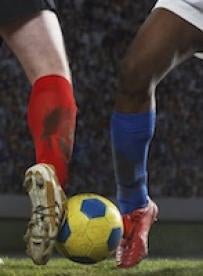When it comes to sports, the U.S. touts a particular brand of American exceptionalism. After all, the United States is home to four of the top ten most popular team sports and forty out of the fifty most valuable sports franchises in the world. Yet, let's not forget that the top three most valuable sports clubs on the list are European soccer powerhouses. The Beautiful Game, the World's Game, is quite a popular sport, with legions of fans hungry (as any American sports nut) for highlights of the day's soccer matches. Indeed, in this respect, the American sports landscape is not unique at all.
Much like the U.S., sports financing for our friends across the pond has become increasingly dependent on the broadcasting rights to live content, as the exclusive rights to broadcast live sports have soared in value. This rise in sports programming licensing fees is forcing the cable and broadcasting industry into a new reality.
Sports programming appears to be one of the main reasons millions of Americans resist cancelling their traditional cable TV subscription (a/k/a "cord-cutting"). Ironically, the high premium costs programmers and distributors pay for sports ultimately get passed down to subscribers, who, due to such increasing costs, may consider less expensive cord-cutting, cord-shaving and over-the-top internet programming alternatives.
In France, the increased costs of live sports content have spurred a fight over the replay of sports highlights, pitting two fundamental rights against one another: property rights and the right to information. On the one side of the pitch we have programmers attempting to limit the manner and frequency with which non-rights holders can broadcast sports highlights, or short extracts, in order to protect the exclusivity that is so crucial to their investment. Facing off against the programmers are sports news shows asserting their right to exploit short extracts as information that is of great interest to the public, guaranteed to them by Article L. 333-7 of the Sport Code. Not surprisingly, French fans' love of soccer is fueling this fight – a battle that has already gone into extra time, dating back to the 1980s.
According to the European Audiovisual Observatory: "Since 1986, Article L. 333-7 of the Sport Code has given the channels the right to broadcast brief excerpts of sports events for which the rights are held by another editor, by virtue of the public's entitlement to be informed." However, implementing legislation was never passed to define the parameters of a "brief excerpt." In the absence of a legislative definition, standard practice and case law in the 1990s gave rise to an accepted rule of ninety-second clips per hour of programming.
However, in February 2012, the French legislature forced the issue, adopting Law Number 2012-158, requiring France's media-governing body, the Conseil Superieur De L'Audiovisuel (the "CSA") to define the parameters of permissible "brief excerpts." On January 15, 2013, the CSA published a deliberation officially allowing monothematic broadcasts (those focusing on only one sport), in addition to general news outlets and multidisciplinary sports shows, to air ninety-second sports extracts, in line with long-accepted practices.
Yet, on October 30, 2014, following pressure from certain stakeholders, the CSA rolled back these previously accepted practices. Specifically, as of January 1, 2015, monothematic broadcasters must wait a full twenty-four hours after the end of the original program's broadcast before retransmitting any sports extracts. Moreover, the CSA placed two additional constraints on top of the ninety-second restriction, limiting clips to "three minutes per day of competition and thirty seconds per match."
According to commentators, the new constraints will most severely impact programs like Telefoot, a soccer-only program aired since 1977, which will now have to wait an entire week to televise clips of "goals scored in Ligue 1 matches the day before." Programmers have argued that such limitation certainly diminishes the clips' value (not to mention their show's timeliness and punch), which comes from the use of live, or near-live, game clips. While consumers can still watch general news outlets or multidisciplinary sports programs for timely highlights, such highlights will no longer be available on single-sport (e.g. soccer-only) programs.
The rights holders clearly lobbied hard and won big concessions in the latest CSA deliberation. It remains to be seen whether France's soccer fans eager for more highlights will fight back, even the score, and ultimately reach their goooooooooooal.








 i
i

